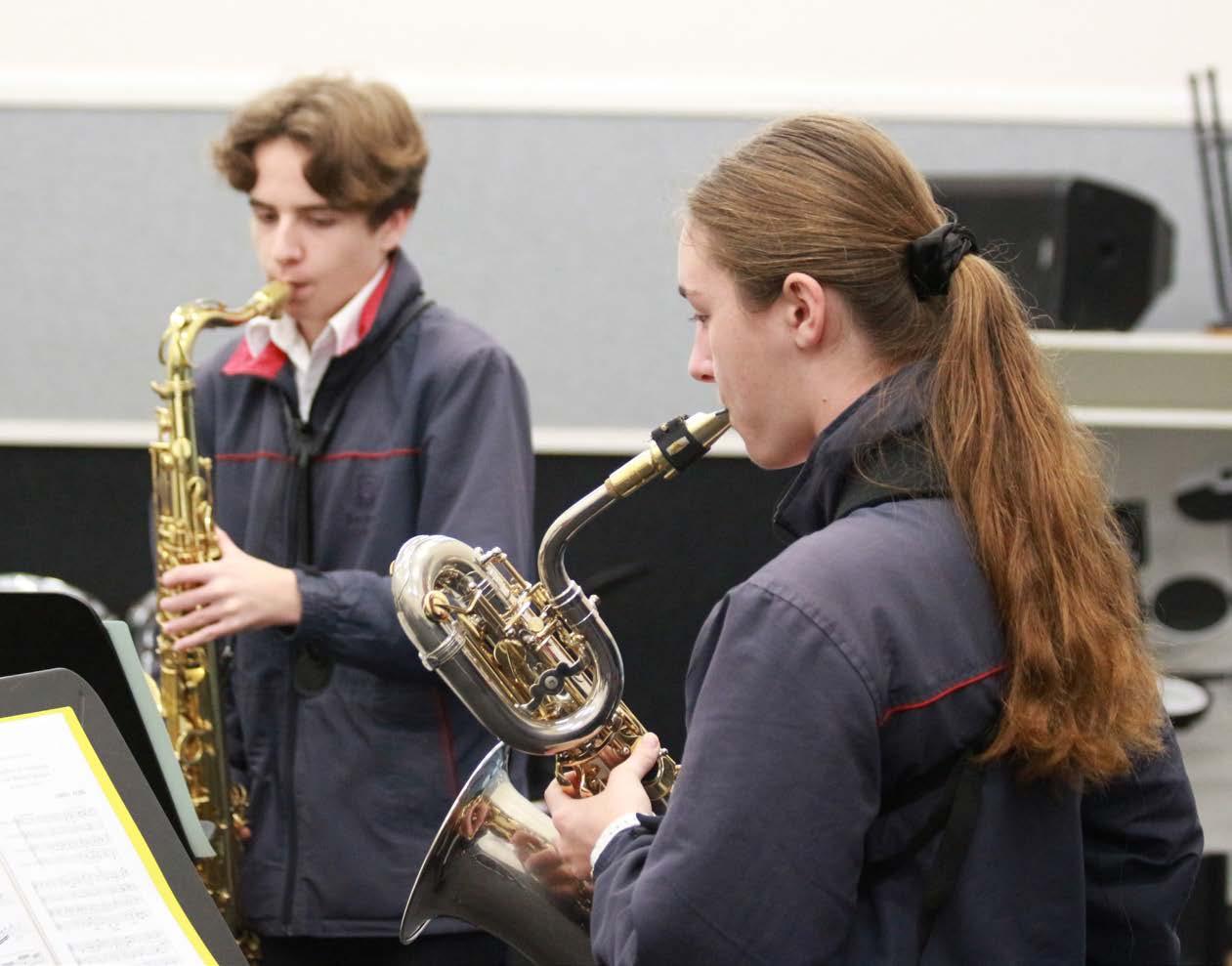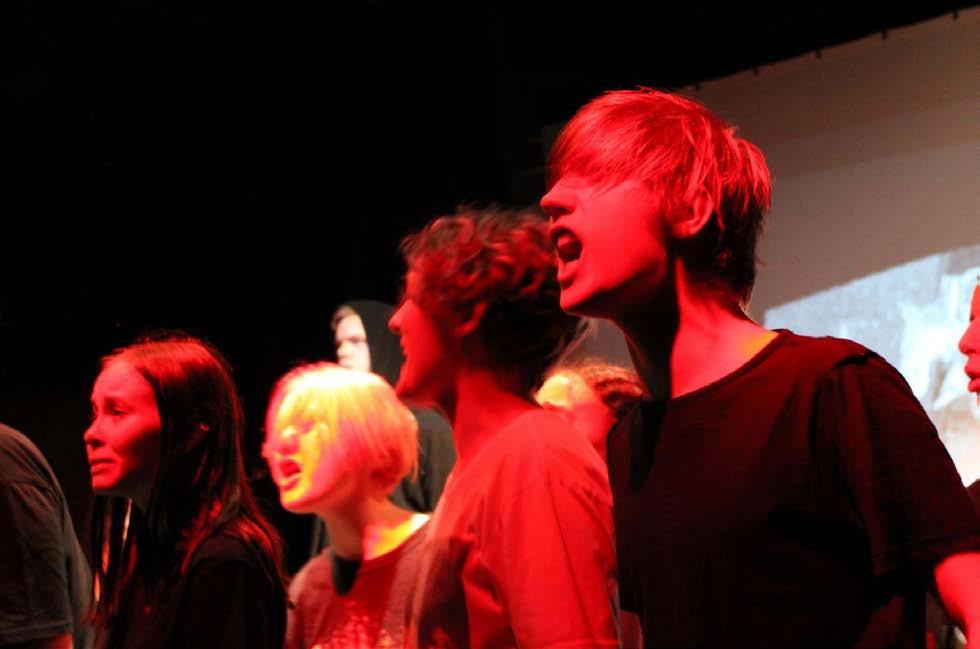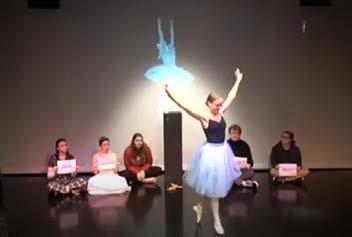
9 minute read
Performing Arts
by Benefitz
In 2020, the school made the decision to adopt and implement a Knowledge-Rich Curriculum strategy in order to best serve the learning needs of our students. In short, this means that subjects are placing extra emphasis on the ‘knowledge’ taught in their curriculum areas, rather than just focusing on teaching students how to best answer NCEA exam questions. Therefore, a concept-based curriculum design model (CDC) is being used to assure that knowledge, not just credits, are at the centre of the learning for students.
This shift constituted quite a challenge for Performing Arts subjects, because our students are not only tested on what they know, but also on their skills of performing, arranging, composing, devising, and choreography. Added to this is the problem of the sheer quantity of work to be re-designed, given that we currently teach upwards of 170 units in Year 9 alone! Some tough questions soon emerged:
How do you add knowledge to primarily skill-based assessments?
How do you manage the workload for staff while introducing fundamental changes?
How do you improve your outcomes through the changes made, rather than changing for the sake of change?
It soon became clear that there had to be careful consideration as to how to go about this task. Instead of throwing out the old and replacing with the new, an assessment had to be undertaken first to measure how knowledgerich our current curriculum already was, and identify points where the enrichment through concept-based curriculum design principles could offer an improved outcome to what we currently have. Consequently, a gradual infusion strategy needed to be devised, rather than a complete and total change.
One area that was identified as could be improved by applying more knowledge was performance practice. Even though most of our students are spending significant amounts of time practising, the efficiency of that practice—and therefore the outcome—could be improved by digging deeper into the science about how to make practice work better for you. Learning about the metacognition of practice was added from Year 9 through to Year 13 in order to evaluate the outcomes of practice, not only through students’ performance marks. Knowledge-rich concepts like deliberate practicing techniques, neurological development, and motivational psychology were placed at the centre of this learning, paving the way for students to move “from practise to practice”.
The most visual aspect of this new teaching unit was the emergence of practice logs which students now have to fill in each week and submit by Sunday evening.
The first results of the new unit were nothing short of astounding. Students clearly communicated the successes and challenges they faced during practising, and teachers and tutors could target their support quickly to very specific questions. The data provided by students through the practice logs is so rich that it has significant meaning for teachers far beyond the narrow scope of improving performance skills, as it provides a holistic view about student learning in music in general. Students demonstrate their musical knowledge in ways that are far deeper than if measured through a written exam paper.
We are still at the beginning of this knowledge-rich infusion, but so far, the results overall are exciting! I would like to invite you, if you have children in the Music curriculum, to talk to them about their logs and maybe even read some of their entries—I promise you that you will be impressed!

Drama
It has been an exciting year for the Drama Department. After a slow year Covid-19 year in 2020, we hit the ground running in 2021. This year, with the introduction of a Knowledge Rich Curriculum, we have scaffolded the year groups into different areas of focus. At Year 9, the focus has been the Principles of Drama and performance; at Year 10, the Fundamentals of Drama and performance; at Year 11, we looked closely at Comedy with a focus on Commedia Dell’Arte; at Year 12, we looked at Tragedy with a focus on Brecht and Epic Theatre; and at Year 13, we looked at New Zealand theatre with a focus on the works of Stanislaski and Realism vs Absurdism.
We started the year with two amazing production evenings; one for our Year 11 cohort who brought tears of laughter to our faces with the very funny Murder Mystery play, and one for our Year 12 cohort who took us deep into the dark world of 1984. Both evenings were a great success and allowed our students to showcase their hard work and dedication to the subject. These evenings really set the standard for the year. Internally we also had great success with our Year 9 production of Romeo and Juliet and our Year 10 production of Macbeth. Not to be out done, our Year 13 cohort brought to the stage the New Zealand play Peninsular by Gary Henderson. At the beginning of the process, they got to meet the playwright in person and had a workshop with him about his process writing the play. This offered the Year 13s a deeper understanding of the text and helped them to create intriguing and well-crafted characters and they performed multiple roles with smooth transitions.
Moving into Term 2, our students took on the challenges of devising. Our Year 11s worked hard on bringing to life the poem Gentle Alice Brown by William Schwenck Gilbert. The Year 12 cohort used their knowledge of Brechtian theatre features and took on social injustices within New Zealand. To help the 12s with their understanding of Brechtian theatre, we were able to take them to see The Life of Galileo by Bertolt Brecht at the ASB Waterfront Theatre. This was a fascinating play, which used many features of Brechtian theatre. Meanwhile our Year 13 cohort delved into history and introduced us to some frightening, but captivating, ‘Historical Figures’. Our juniors offered some comic relief with their improvisation unit.


Markus Fritsch, HOD Performing Arts



2021 has been a busy and exciting year in the Dance Department. The aim, this year, was to consolidate on learning and content after a Covid-19 disrupted year in 2020. Whilst this has not been the smooth journey we had hoped for, I am thrilled to see our students excel in their achievements both in internal and external standards.
We have maintained consistency and excellence in our junior classes and are proud of these students demonstrating strong school values. The Year 9 Dance programme has been a big success this year, with fantastic feedback from our junior dancers and whānau. There have had many passionate dancers through the Year 9 programme this year and we look forward to seeing what they will achieve in through the Year 10 course next year. The Year 10 programme continues to provide a variation of dance styles and choreography opportunities for our students, as well as expanding on their analytical skills with the learning of the Dance elements. Our Year 11 Dance students have furthered their skills in jazz, contemporary and musical theatre. Year 12 have pushed the boundaries with the contemporary repertoire standard and excelled in the ethic/ social standard with the learning of the jive. Our senior students had the opportunity to attend the show Movement by Footnote Dance Company. This was a fantastic, eye-opening experience for our students to see imaginative choreographic works live on stage.


At Year 13, our cohort of students have excelled in both the dance performance course, and the choreography course. This year our dance performance students explored varying styles of dance from African, contemporary, and musical theatre. Our choreography course continues to provide a platform for students to produce their own dance works and receive the opportunity to perform these at Dance showcase. We are also proud of our dance scholarship pathway that is being provided for our students. This in-depth process allows our students to be compared to the best and brightest dance students nationwide to gain a monetary scholarship for tertiary study.
We have introduced a new event this year named Choreography by Candlelight where our senior students’ choreographic works are showcased. We felt that our students were creating some truly excellent work which needed a specific platform to be showcased at.
We are thrilled to see the continual growth in Dance and witness the transferable skills our students gain being put into action. Our dance programme is held in high esteem and continues to excel and provide new opportunities for our students. Alonzo King says, “The qualities we admire in great dancing are the same qualities we admire in human beings: honesty, courage, fearlessness, generosity, wisdom, depth, compassion, and humanity”. We know that these values and the transferrable skills gained through the performing arts are ones that will help to have well-rounded, happy, and healthy young people.

Term 3 saw our students pick up the pace again; this time our Year 11’s moved into Commedia Dell’Arte. Commedia Dell’Arte is an ancient comic theatre form which requires students to build strong physicalisation skills, as well as encouraging them to think on their feet and improvise. Our Year 12s took on Brecht’s most famous play, Mother Courage and her Children, and delved into the depths of political theatre. Meanwhile, our Year 13s were creating scenes from various contemporary plays, including Death of a Salesman, A StreetCar Named Desire and several Bruce Mason plays. The students were tasked with using an array of techniques to bring these characters to life.

Our new cohort of Year 9s picked up their chainsaws, pitchforks, and other assorted weapons in their production of 10 Ways to Survive the Zombie Apocalypse, while our Year 10s devised physical theatre based on Shaun Tan’s The Arrival. In Term 4, we did our final revision for the external exams for the seniors, and we wished them good luck and best wishes moving into next year and their future endeavours.

Our juniors continued the good work, with the Year 10’s creating some entertaining and educational Greek Theatre and our Year 9s devising their own wonderful pieces.
Overall, despite the setbacks of Covid-19, our Drama & PFA students have had an incredible year and have gone from strength to strength. Once again, a huge thank you goes to the drama staff: Sara Hunt, Sophie Catterall, and Renee Richards, and their commitment to their students and the overall vision of the department. I couldn’t do it without you. I look forward to welcoming back students to 2022 and I look forward to what we shall go on to create together!





